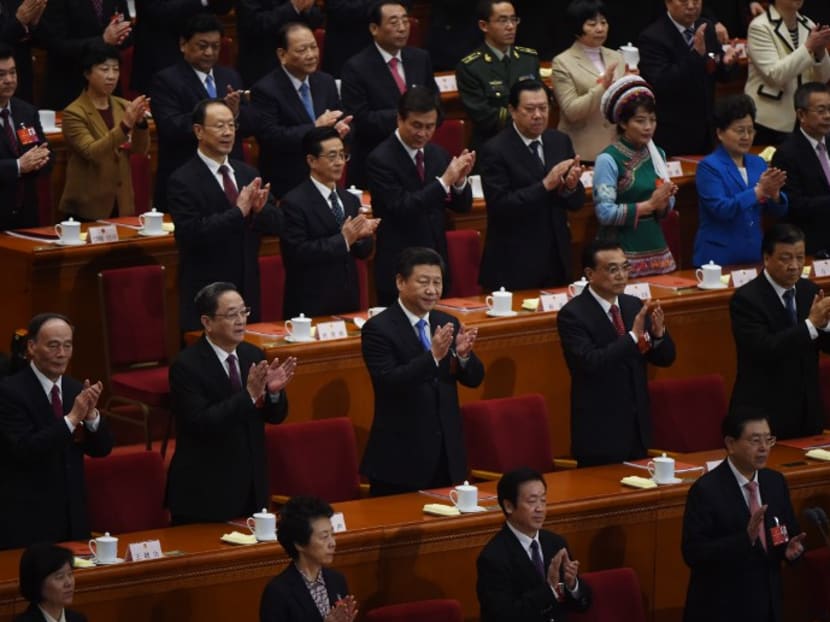China uses 'negative lists' to screen candidates ahead of key congress
BEIJING — Holding a foreign passport or expressing doubts about Communist Party policies are among the behaviours that could get candidates disqualified from 2,300 coveted seats at China’s leadership reshuffle this year.

Chinese leaders during the closing ceremony of the National People's Congress earlier this month. Photo: AFP
BEIJING — Holding a foreign passport or expressing doubts about Communist Party policies are among the behaviours that could get candidates disqualified from 2,300 coveted seats at China’s leadership reshuffle this year.
For the first time, local party committees are using “negative lists” – including everything from bribe-taking to involvement with illegal construction projects – to screen delegations to the 19th Party Congress, which will set China’s political hierarchy for the next five years.
A front-page article endorsing the moves in the party’s flagship People’s Daily newspaper on Monday (Mar 20) showed the push has support from the highest levels.
“The party must not let unqualified people get nominated as party delegates,” the article said. It cited the efforts of the northern province of Hebei surrounding the capital Beijing, where at least four potential delegates were disqualified after failing to meet the requirements, the paper said.
The clampdown represents President Xi Jinping’s latest attempt to fight perceptions of chronic corruption in China, which he has described as the greatest threat to almost seven decades of one-party rule.
Some 1.2 million officials have been punished since Mr Xi came to power in 2012 and launched an unprecedented anti-corruption campaign, with targets ranging from local political bosses to the country’s former top general.
“The negative list and the new delegate-selection rules could help the party and party leaders bolster their authority among the public,” said Professor Zhu Lijia of the state-run Chinese Academy of Governance in Beijing.
“Leaders are trying to repair the party’s image after realising the party could lose the support of the public if its members continue to be corrupt.”
Some 83 per cent of Chinese people surveyed by the Pew Research Center last year described corruption as a problem, more than any other issue.
At the same time, 64 per cent said they believed the situation would improve over the next five years.
The negative lists – a concept often associated with trade negotiations in which anything not specifically mentioned is allowed – gives Mr Xi yet another tool to shape the key party gathering in Beijing.
While no date has been set, the congress is expected to occur in the second half of the year.
The twice-a-decade event is crucial for Mr Xi to secure lasting influence beyond 2022, when his own tenure would be expected to end. At this year’s meeting, 11 of 25 Politburo members – including five of seven members on its supreme Standing Committee – could be replaced.
An October party conclave that elevated Mr Xi to the country’s “core” leader bolstered the top anti-graft watchdog and established a code of conduct for the party’s 89 million members. The code pledged greater scrutiny of senior leaders, up to and including the Standing Committee.
Preparations for the congress are underway in some provinces and ministries. The eastern province of Anhui and the State Tobacco Monopoly Administration both held meetings on Monday urging officials to get ready for the gathering, according to the official Anhui Daily and the agency’s website.
While delegates to past congresses underwent background checks, listing prohibited behaviors gives authorities new license to delve into the personal lives of candidates. Notices published by party committees cite funding from foreign organisations or connections with religious groups as reasons for exclusion – both longstanding targets for suspicion in the nationalist and atheistic ruling party.
Shaoxing, a city of almost five million in the eastern province of Zhejiang, tasked 23 government agencies with executing a “stringent review process” for delegates, according to the official Zhejiang Daily newspaper.
The group examined the “beliefs, political and moral character and partisanship” of 20 candidates, the paper said. Law enforcement officials also checked their properties for unlicensed building projects. BLOOMBERG





